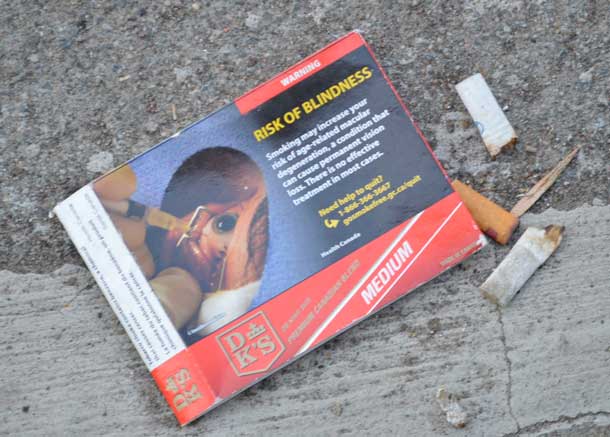
THUNDER BAY – HEALTH – Smoking is not only bad for your health; it also puts 400,000 children in poverty in the United Kingdom, according to UK research just published in the open access journal BMC Public Health. Smoking places a financial burden on low income families, suggesting that parents are likely to forgo basic household and food necessities in order to fund their addiction, according to Tessa Langley one of the researchers.
Here in Thunder Bay, at $8CDN for a small pack of cigarettes, a pack a day smoker will spend almost $250 per month on cigarettes alone – a total of $3000 annually. Think of the cost if both parents smoke, those numbers double.
This is the first UK study to highlight the extent to which smoking exacerbates child poverty.
The findings are based on national surveys which estimate the number of children living in poverty by household structure. In 1999, the UK government announced a target to abolish child poverty by 2020, though this target is unlikely to be met. It is therefore crucial to identify avoidable factors that contribute to and worsen child poverty.
“Smoking reduces the income available for families to feed, clothe and otherwise care for their children living in low-income households. This study demonstrates that if our government, and our health services, prioritized treating smoking dependence, it could have a major effect on child poverty as well as health,” says lead author, Dr Tessa Langley from the UK Centre for Tobacco and Alcohol Studies at the University of Nottingham.
Smoking is an expensive habit and one that impoverishes millions of people around the world. In the US, smokers spend less on housing than non-smokers and recent research in India showed that smoking cuts spending on food, education, and entertainment.
This new study estimates that 1.1 million children in the UK, almost half of all children in poverty, were living with at least one parent who smokes. A further 400,000 would be classed as being in poverty if parental tobacco expenditure were subtracted from household income.
In July 2014, the weighted average price of 20 cigarettes in the UK was £7 (GB). Although many smokers save money by opting for budget brands or switching to hand rolling tobacco, the cost of their smoking is still a substantial drain on the budgets of families living on low incomes. “The poverty threshold income level for a two parent household with two children is £392. If both parents are smokers, these households will be spending an average of £50 on tobacco per week, which is a big drain on an already tight budget,” says Tessa Langley.
This is a key opportunity for the UK Government to take action to improve the lives of millions of children. “Tobacco control interventions to encourage low income smokers to quit, would not only improve health but also alleviate poverty,” says Tessa Langley. Future studies are needed to determine what families sacrifice to sustain their habit, whether they do without fresh fruit or food in general; heating bills or clothing. This would provide a better picture on the burden of smoking in poor households.
The Thunder Bay Regional Health Sciences Centre offers people the opportunity to quit smoking.
Smoker’s Helpline – Connect to Quit
- Free, personalized advice, counseling and a quit plan that suits you. Telephone, online, and text options available.
- Call 1.877.513.5333 or go to www.smokershelpline.ca
Thunder Bay District Health Unit
- Free, individual cessation counseling (NRT voucher system available for eligible clients)
- Take Control: Personal Tobacco-Free Counseling www.tbdhu.com
Call Carrie – Tobacco Treatment Specialist – at 807.625.5982
The Quit Coach
- Individual Cessation Counseling
- Fee for Service
Contact Jim Morris at 472.6309 or email jtmorris@tbaytel.net
Thunder Bay Medical Centre – 63 N. Algoma Street
Pharmacists
Your local pharmacist is also part of the integrated healthcare team available to provide valuable support for quitting smoking. Ask him or her about your smoking cessation needs.





